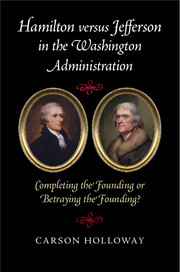 Hamilton versus Jefferson in the Washington Administration
Hamilton versus Jefferson in the Washington Administration Book contents
- Frontmatter
- Dedication
- Contents
- Acknowledgments
- 1 Introduction
- PART I A DEBATE BETWEEN CABINET COLLEAGUES
- PART II A CLASH OF RIVAL PARTY LEADERS
- PART III Founding Foreign Policy
- 11 Two Views of the French Revolution
- 12 Faith among Nations I: Jefferson's Opinion on the French Treaties
- 13 Faith among Nations II: Hamilton's Opinion on the French Treaties
- 14 The Constitutional and Political Theory of Hamilton's Pacificus Papers
- 15 Jefferson, Madison, and Helvidius' Critique of Pacificus
- 16 Conclusion
- Index
12 - Faith among Nations I: Jefferson's Opinion on the French Treaties
from PART III - Founding Foreign Policy
Published online by Cambridge University Press: 05 November 2015
- Frontmatter
- Dedication
- Contents
- Acknowledgments
- 1 Introduction
- PART I A DEBATE BETWEEN CABINET COLLEAGUES
- PART II A CLASH OF RIVAL PARTY LEADERS
- PART III Founding Foreign Policy
- 11 Two Views of the French Revolution
- 12 Faith among Nations I: Jefferson's Opinion on the French Treaties
- 13 Faith among Nations II: Hamilton's Opinion on the French Treaties
- 14 The Constitutional and Political Theory of Hamilton's Pacificus Papers
- 15 Jefferson, Madison, and Helvidius' Critique of Pacificus
- 16 Conclusion
- Index
Summary
Upon hearing that France had declared war on Great Britain, President Washington sought advice from his cabinet about the proper American line of policy. The question for Washington was not whether America should remain neutral but how it should go about remaining neutral. The president did not regard the basic decision to remain neutral a controversial one, and neither did the other leading members of his administration. Hamilton, of course, is famous as a vigorous proponent of neutrality. “Every discreet man,” he wrote, “must perceive at once that it is highly the interest of this country to remain at peace and as a mean to this to observe a strict neutrality in the present quarrel between the European powers.” Jefferson was no less convinced of the necessity of such a policy. Even before Washington sought the cabinet's advice, Jefferson had written to him to express his “opinion that we take every justifiable measure for preserving our neutrality” in the war. Hamilton and Jefferson's differences about the merits of the French revolution did not lead them to disagree about whether America should take any active part in the war that could determine its success or failure.
This agreement as to the country's basic posture toward the warring parties, however, did not prevent disagreements between Hamilton and Jefferson regarding other questions of policy and principle that arose in relation to American neutrality. These disagreements were brought into play by a set of written questions that Washington submitted to the cabinet as a basis for its deliberations about neutrality policy. The first of these queries asked whether the government should actually issue some kind of “proclamation” in order to prevent “interferences of the citizens of the United States in the war between France and Great Britain” and whether, if such proclamation were issued, it should or should not “contain a declaration of neutrality.” Most of the rest of the queries dealt more specifically with the question of America's relationship to France– a relationship that, involving treaties of commerce and alliance, could complicate America's effort to remain neutral. Should the government of the United States receive a French minister, and, if so, with or without qualifications? What was the status of the treaties between France and America?
- Type
- Chapter
- Information
- Hamilton versus Jefferson in the Washington AdministrationCompleting the Founding or Betraying the Founding?, pp. 222 - 237Publisher: Cambridge University PressPrint publication year: 2015


